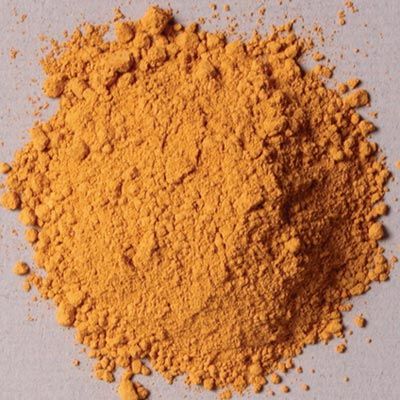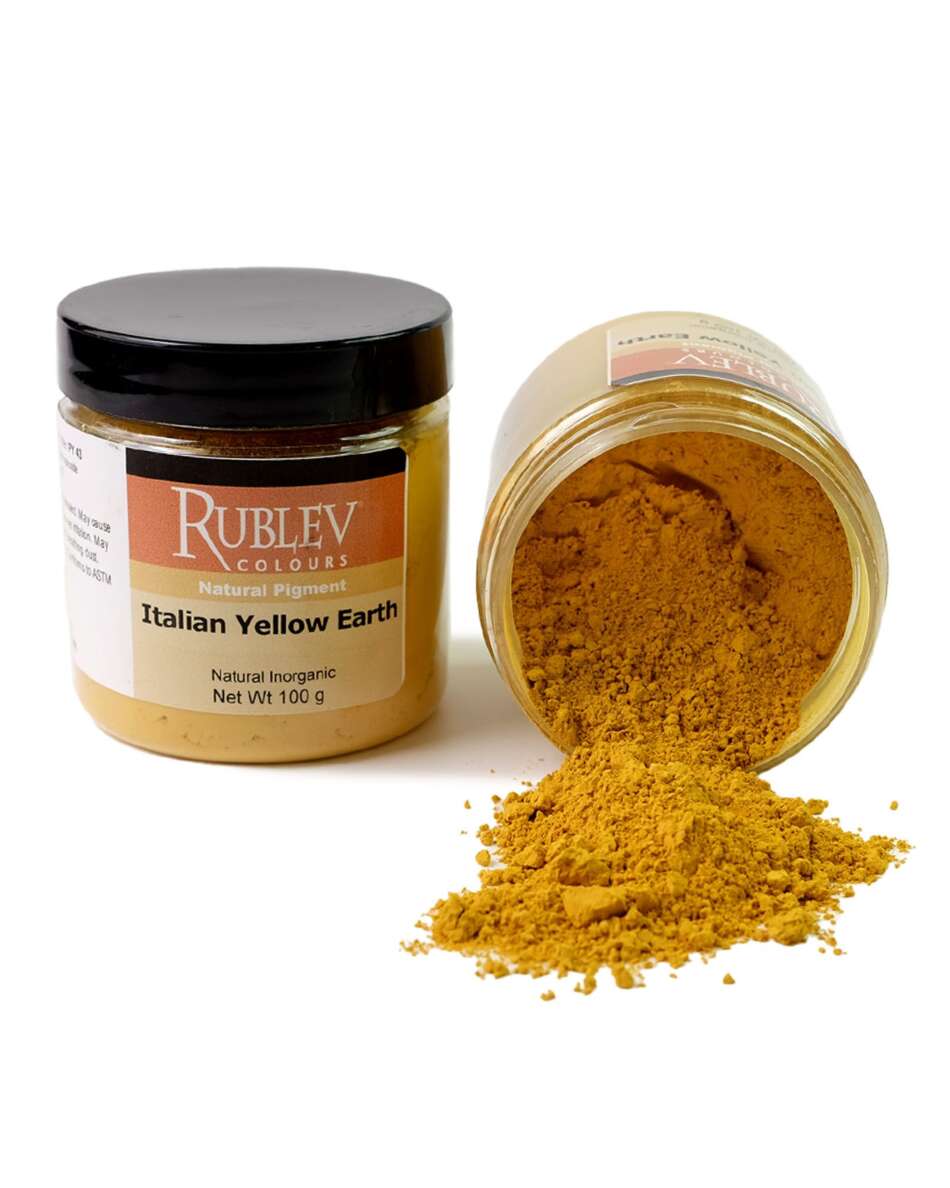Italian Yellow Earth (Ocher) Pigment
A deep yellow that is semi-transparent, permanent and works well in all mediums. Learn more.
Italian Yellow Earth is a natural iron oxide hydroxide mineral (goethite) from quarries in northern Italy.
| Pigment Names | |||||||
| Common Names: | English: yellow earth French: terre jaune German: Masse gelb Italian: terra giallo Spanish: tierra amarillo | ||||||
| Synonyms: | Goethite, limonite, raw sienna, yellow earth, yellow ocher, yellow iron oxide, yellow hydrated oxide, and iron hydroxide pigment | ||||||
| Alternate Name: | Mars yellow is the name given to the synthetic form of yellow iron oxide hydroxide. | ||||||
| Nomenclature: |
| ||||||
Origin and History
Since antiquity, iron oxide earth pigments have occurred naturally as yellow (goethite) or red (hematite) earth. Yellow earth has been used as a pigment since prehistoric times and is perhaps the most widely used pigment for artists' paints.
Source
Italian yellow earth is a natural earth containing clay tinted by hydrated iron oxide and is composed of goethite and traces of clay, gypsum, or manganese carbonate. Historically, yellow earth was designated by the mineral name limonite. Limonite is not a true mineral but a general term used to describe all forms of hydrated iron oxide minerals (α-FeOOH) that occur as natural earth. Limonite includes the minerals goethite, akaganeite, and lepidocrocite. The names of yellow iron oxide pigments are confusing. The names earth and ocher are suitable when it is clear that the pigment comes from a natural source. Earth is a more general term since ocher refers to a specific type of iron oxide deposit containing kaolin (clay) and quartz. For example, iron oxide content must not be less than 12% to be considered an ocher. Depending upon the hydrated iron oxide's content, the ocher's color varies from light yellow to orange-red. Like red iron oxides (hematite), they are found worldwide and have been used as pigments since prehistory. French ocher, historically one of the best grades of limonite, contains about 20% iron oxide and is high in silica.
Ocher grades into sienna, a yellow-brown pigment containing a higher percentage of iron ore than ocher and some manganese dioxide. Sienna grades into umber, which is darker brown and contains a higher percentage of manganese dioxide. Burnt sienna is brown or bright red, and burnt umber is a darker brown than umber.
Ocher is not naturally usable as a pigment and therefore needs to undergo several important processes, such as:
- Extract ore from the quarries.
- Separate ocher from sand (if necessary) using water and centripetal force.
- Blend different ocher extracted from diverse veins to obtain the selected colors.
- Grind to less than 50 microns and pack.
Permanence and Compatibility
Ocher is among the most permanent colors in the artist's palette. It is compatible with all other pigments and can be used with good results in all mediums.
Oil Absorption and Grinding
Ocher absorbs a moderately high amount of oil. The oil absorption ratio is 30–45 parts by weight of linseed oil to 100 parts by weight of pigment. If the measurement were grams, Italian yellow earth would require 30–45 grams of linseed oil to grind 100 grams of pigment to form a stiff paste. It slows the drying of oil paint but forms an excellent film.
Toxicity
Ocher is not considered toxic, but care should be used in handling the dry powder pigment to avoid inhaling the dust.

Rublev Colours Pigment: Italian Yellow Earth
| Pigment Information | |
| Color: | Yellow |
| Colour Index: | Pigment Yellow 43 (77492) |
| Chemical Name: | Iron Oxide Hydroxide |
| Chemical Formula: | α-FeOOH |
| ASTM Lightfastness Rating | |
| Acrylic: | I |
| Oil: | I |
| Watercolor: | I |
| Properties | |
| Density: | 2.9–4.3 |
| Hardness: | 4.0–5.5 |
| Refractive Index: | 2.260–2.398 |
| SKU | 431-42 |
|---|---|
| Brand | Rublev Colours |
| Vendor | Natural Pigments |
| Processing Time | Usually ships the next business day. |
| Color | Yellow |
| Pigment Type | Inorganic, Earth, Natural |
Health & Safety: There are no acute or known chronic health hazards with the anticipated use of this product (most chemicals are not thoroughly tested for chronic toxicity). Protect yourself against potentially unknown chronic hazards of this and other chemical products by avoiding ingestion, excessive skin contact, and inhaling spraying mists, sanding dust, and concentrated vapors from heating. Contact us for further information or consult the SDS for more information. Conforms to ASTM D-4236.



